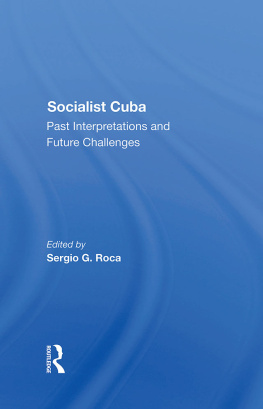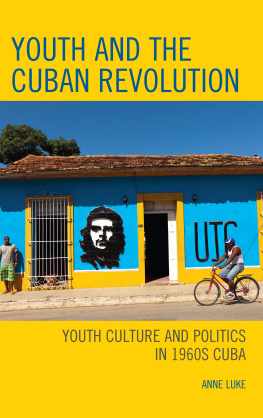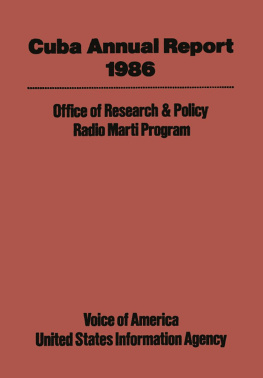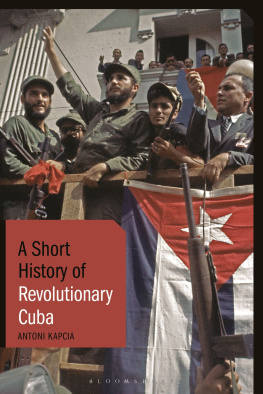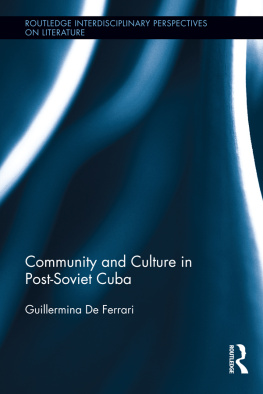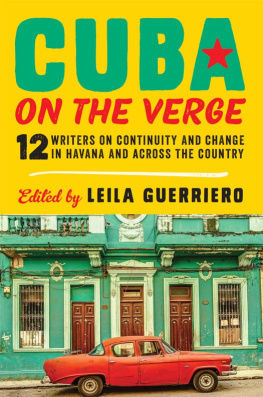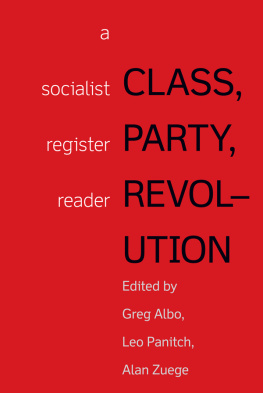Socialist Cuba
Socialist Cuba
Past Interpretations and Future Challenges
Edited by
Sergio G. Roca
First published 1988 by Westview Press, Inc.
Published 2019 by Routledge
52 Vanderbilt Avenue, New York, NY 10017
2 Park Square, Milton Park, Abingdon, Oxon OX14 4RN
Routledge is an imprint of the Taylor & Francis Group, an informa business
Copyright 1988 Taylor & Francis
All rights reserved. No part of this book may be reprinted or reproduced or utilised in any form or by any electronic, mechanical, or other means, now known or hereafter invented, including photocopying and recording, or in any information storage or retrieval system, without permission in writing from the publishers.
Notice:
Product or corporate names may be trademarks or registered trademarks, and are used only for identification and explanation without intent to infringe.
Library of Congress Cataloging-in-Publication Data
Socialist Cuba : past interpretations and future challenges / edited by Sergio G. Roca.
p. cm.(Westview special studies on Latin America and the Caribbean)
Includes index.
ISBN 0-8133-7461-8
1. CubaPolitics and government1959- . 2. SocialismCubaHistory20th century. 3. CubaEconomic conditions1959- . 4. CubaSocial conditions1959- . I. Roca, Sergio. II. Series.
F1788.2.S63 1988
972.91'064dc19
88-15374
CIP
ISBN 13: 978-0-367-28777-1 (hbk)
In honor of
CARLOS F. DIAZ ALEJANDRO
Contents
, Roberto Gonzlez-Echevarra
PART ONE
POLITICAL ASPECTS
, Jorge I. Domnguez
, Juan M. del Aguila
, Rhoda Rabkin
PART TWO
ECONOMIC ISSUES
, Carmelo Mesa-Lago
, Sergio G. Roca
, Jorge F. Prez-Lpez
PART THREE
SOCIAL RELATIONS
, Sergio Daz-Briquets
, Carlos Moore
, Margaret E. Crahan
, Sergio G. Roca
After almost thirty years of exercising revolutionary power, Castro declared: "Now we are really going to build socialism!" What are we to make of this statement? If the start of construction of Cuban socialism still represents a future task, how is the past record to be interpreted? How are we to assess the accomplishments and the shortcomings of the 1960s, 1970s, and early 1980s? Why is Cuba now engaged in a "process of rectification of errors and elimination of negative tendencies"? What is Castro's new "correct path to socialism"? What are the implications of the Third Party Congress held in 1986? This volume presents detailed accounts and compelling analyses of several aspects of Cuba's socialist reality from the dual vantage points of sound research and balanced appraisal. The contributors, recognized to be in the forefront of Cuban scholarship, interpret the recent past and outline future challenges.
Ample time has now elapsed to undertake an evaluation of Cuba's socialist record as a separate domain, not unconnected to pre-revolutionary conditions but amenable to distinct inquiry. Cuba now has a socialist past subject to its own interpretation. Revolutionary power has long been secured and consolidated, hence forward projections are unavoidable. Cuba now has a socialist future subject to its own challenges.
In evaluating the past and making projections for the future, the contributors focus on political factors, economic variables, and social issues (some with deep historical roots) that continue to affect the course of events within the socialist setting, even as they are affected by revolutionary conditions (such as ideology) and idiosyncratic forces (such as the role of Fidel). This volume is not really a catalogue of pluses and minuses, of victories and defeats, of successes and failures. It is not so much about what was achieved and what remains to be done. The authors examine change within continuity and analyze stability within revolution. We are concerned with the uneven rate of development (and even retrogression) among the political, economic, and social realms of revolutionary life in socialist Cuba.
This volume is modest in scope, concentrating on the causes and implications of the key changes unleashed in political aspects, economic issues, and social relations within the context of the Third Party Congress in 1986. The book does not attempt to be comprehensive and the presentation does not aim at uniformity. The authors alone bear responsibility for the findings, conclusions, and all other statements in this volume. The editor alone is accountable for the views expressed in the concluding chapter.
The work is divided into three parts and the summary-conclusion. In the political aspects section, Jorge I. Domnguez analyzes the major changes in party and government leadership occurring after 1984; Juan M. del Aguila pinpoints the complex forces operating to produce both equilibrium and tension in Cuban foreign relations; and Rhoda Rabkin explores the relationship between policy-making by the party elite and responses on the part of both bureaucracy and workers.
In the economic issues section, Carmelo Mesa-Lago describes the recent drastic changes in economic organization and poiicy; Sergio G, Roca discusses the reasons and consequences of continued international economic dependency; and Jorge Prez-Lpez explains the role of Soviet oil trade in Cuba's export earnings and external balance.
In the social relations section, Sergio Diaz-Briquets examines the potential implications for socioeconomic developments of Cuba's unique post-1959 demographic patterns; Carlos Moore underscores the racial confrontations permeating now as before every facet of private and public existence in the island; and Margaret E. Crahan analyzes the struggle of the Roman Catholic Church in Cuba to develop itself institutionally and otherwise within the context of a socialist revolution.
In the final chapter, the editor outlines the main arguments and evaluations presented by the authors and elaborates his own views, which attempt to link past interpretations and future challenges.
Sergio G. Roca
This volume emerged from the "Symposium on the Future of Cuba" held at Columbia University in New York City. The conference was conceived and promoted by Carlos F. Diaz Alejandro, Professor of Economics at Columbia University. After his untimely death, the symposium was held in his honor. This collection of essays about his native country is an extension of that tribute. In "Remembering Carlos," Roberto Gonzlez-Echevarra draws a sketch of Carlos and his spirit for the benefit of those of us who just mimic integrity and merely aspire to generosity.
All of the conference contributorsJuan M. del Aguila, Sergio Daz-Briquets, Carmelo Mesa-Lago, Rhoda Rabkin, and Sergio G. Roca thoroughly revised and updated their materials for publication. To extend the topical coverage, additional essays were solicited from Margaret E. Crahan, Jorge I. Domnguez, Carlos Moore, and Jorge Prez-Lpez. Roberto Gonzlez-Echevarra and Lisandro Prez also participated in the conference. The commentators/discussants were Douglas A. Chalmers, Alejandro Portes, and Alfred Stepan.
The hard work of organizing and conducting the conference, after the death of Carlos in the summer of 1985, fell upon two of his most able students, Flix E. Martn Gonzalez and Enrique S. Pumar. They must be recognized for their dedication to the realization of the conference and commended for its successful outcome.

